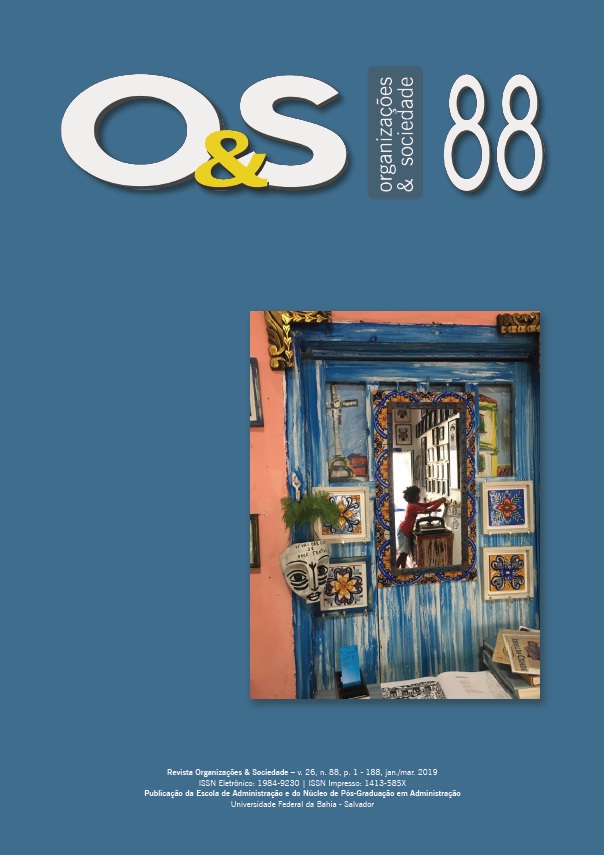Editorial
Abstract
Dear Readers,
The journal Organizações & Sociedade reaches 2019 publishing volume 26 and issue 88, entirely in English. To reach this point, the efforts and support were plenty. We are deeply indebted to Capes and CNPq for the funding granted in 2018, which was essential for the continuity of the basic activities of the journal. As always, we thank our reviewers, over 160 professionals, who have contributed to improve around 360 papers that were submitted in 2018. Notably in this issue, we would like to give special thanks to the authors who were willing to translate their papers into English, helping us to fulfill the demands of the data base where we are indexed.
Concerning this aspect, it is worth explaining that O&S understands that the publication of articles in the English language contributes to its process of internationalization, as it can then be read by people from all over the world who are interested in the themes covered herein. However, we understand that this practice is loaded with questions that trouble us, for instance: Is it fair to “force” the authors whose papers (written in Portuguese) are accepted to pay for the translation so that their papers can be published? Wouldn’t our students, at undergraduate and graduate levels, face more difficulties having to read the texts in English? By following such course of action wouldn’t we be privileging a pretense internationalization undermining a nationalization that has been conquered? Shouldn’t our financing institutions allocate part of the resources of publishing grants for the translation of papers, as internationalization has been used as a precondition for these very resources to be granted? We face many other questions and concerns at this moment. For our journal, we believe that 2019 will be a decisive year considering that at present 99,9% of our resources come from public notices, partnerships, and a great deal of goodwill from our reviewers, authors and the editorial staff involved.
However, despite all that, we have some good news for this year. One of them is that our webpage is being totally restructured and we believe that by March you will encounter a neater, friendlier and more beautiful virtual environment. The other piece of news is that, as much as possible, our page will have a version in Portuguese, in html format, of the articles published in English. Our aim is to minimize the impact of the publications in English on the users who do not master the English language. But, it is worth pointing out that as a bilingual publication involves resources that O&S does not currently possess, the html files will not be reviewed nor formatted in accordance with the required layout, that being the sole responsibility of their authors.
Finally, O&S is seeking to enable ahead of print publications to minimize the negative impact of the long period authors have to wait so that their accepted papers are published (which, in our case, is around one year). We believe that increasing the time articles are available on our site and databases means increasing the potential for downloads, reading and subsequent citations. This will be good for the author, the readers and, of course, O&S.
In this first edition of 2019, we will present the articles in the order they are published in this issue. In the first article, “Relationship between quality in accounting information and organizational characteristics of the third sector entities”, written by Fernando M. Ramos and Roberto Carlos Klann, the relationship between the quality of accounting information and the organizational characteristics of third sector entities is evaluated. The authors worked with a probabilistic sample comprised of 392 entities and concluded that non-profit organizations and regulatory bodies need to improve the process of disclosing accounting information, both in terms of decision making and accountability.
In the second article, entitled “Between the Conceived and the Lived, the Practiced: the Crossing of Spaces at the Arts and Crafts Fair of Namorados Square in Vitória / ES, Brazil”, by Fabiana Florio Domingues, Letícia Dias Fantinel and Marina Dantas de Figueiredo, the authors sought to understand the way the organizational space at the Arts and Crafts Fair in the Namorados Square in the city of Vitória (state of Espírito Santo), is constituted in the intertwinement of uses that different subjects elaborate for the urban space. The ethnographic data were examined under the light of categories that articulate theoretical propositions from the authors Henri Lefebvre and Michel de Certeau. The results indicate that the organization of the fair is composed by provisional practices, whose existence is permeated by manifestations of power, resistance and conflict, emerging from the daily life of the subjects.
In the third article, elaborated by Sueli Menelau, Luiz Akutsu, Antônio Isidro-Filho and Antônio Sérgio Araújo Fernandes, “Strategic Resonance and Innovation in Public Security Services in Brazil”, the aim was to test, through the construction of two scales, an exploratory contribution of a model of the relationship between strategic resonance (ER) and innovation in public security services (IPSS). The object of analysis was the Community Security Stations (CSSs) of the Federal District Military Police (FDMP). The results reveal that, in that context, the CSSs are an innovation in public security services which indicate that policing is linked to the interactions between the population and the Federal Police, in a relationship that is composed by the human, structural and operational characteristics of the service in question.
The fourth article, written by Paulo Ricardo Zilio Abdala and Maria Ceci Misoczky, is named “The Brazilian new middle class stratagem: dialectics of consumption and overexploitation of labour renewal”. The argument put forth by the authors is that the idea of the emergence of a New Middle Class in Brazil was a stratagem for the organization of a positive agenda with transitory social consensus. In order to develop this idea, the authors use the theory of social class to discuss the theory of stratification. Besides that, the researchers also articulate authors from the Brazilian Social Thought, such as Álvaro Vieira Pinto and Ruy Mauro Marini, focusing on notions as consumption, social classes, work and production, showing that the expansion of consumption, the basis of the new middle class stratagem, leads to a temporary change in people’s life conditions at the expense of deepening the overexploitation of labor.
The fifth article, “Bernard Lonergan and Alberto Guerreiro Ramos: Dialogues between the existential subject and the parenthetical man”, by Laís Silveira Santos, Mauricio C. Serafim and Daniel Moraes Pinheiro, presents a dialogue between Bernard Lonergan, who addressed the topic of human action and ethics, and Alberto Guerreiro Ramos, who created the concept of the parenthetical man, defined as a rational being par excellence in his/her substantive dimension. The authors identified that a similar comprehension of the world and human relations underlies the thought of both authors; they then highlight the question of the critical awareness of the parenthetical man and the consciousness of responsibility of the existential subject.
In the sixth article, written by Ivan Filipe de Almeida Lopes Fernandes and Gustavo Andrey de Almeida Lopes Fernandes, titled “Economic voting in Brazilian presidential elections: evidence with panel data from municipalities in São Paulo”, a new data panel of 625 Brazilian municipalities over 5 election years is used to analyze the influence of the local level economic performance on the proportion of votes obtained by the incumbent candidate in national elections. The results suggest that the performance of the local economy is relevant in national elections. Besides that, the results also indicate that the mayors play an important role in national elections in terms of influencing votes that are favorable to the coalition in power.
The seventh article, “Pace of modal shifts in internationalization processes within a firm”, by Kátia de Melo Galdino, Sérgio Fernando Loureiro Rezende and Bruce T. Lamont, brings a research of qualitative nature and with a longitudinal perspective, namely a case study case, of the internationalization of a Brazilian medium-sized firm that established a footprint in 16 foreign markets over the period of nearly three decades. They concluded that the processes of internationalization can be classified in three groups, according to pace: an Unmovable Internationalization Process, an Inert Internationalization Process and an Accelerated Internationalization Process. The authors suggest that, in the same process there are several internationalization processes that unfold in distinct paces within the same firm.
The last article, entitled “Teachings from Russian Art to Organizational Learning”, authored by Rodrigo Robinson and Márcio Pascoal Cassandre, establishes a connection between the concepts and practices of Russian Art and Organizational Learning (OL), considering the human being in his entirety, i.e., as a spiritual being. Departing from Vygotsky’s ideas on Double Stimulation and the method of Ascending from the Abstract to the Concrete, used in the Cultural-Historical Activity Theory (CHAT), the authors correlate the potential of Art in stimulating and developing man’s learning as a spiritual being with OL. Art offers the possibility of awakening a spiritual force that can move man and “awaken” him to his role of agency, transforming his life and his reality.
We hope you enjoy reading this issue.
Ariádne Scalfoni Rigo
Editor-in-chief
Downloads
Downloads
Published
How to Cite
Issue
Section
License
This work is licensed under a Creative Commons Attribution 4.0 License.
The O&S adopts a Creative Commons Attributions License 4.0 in all published works, except where specifically indicated by copyright holders.






